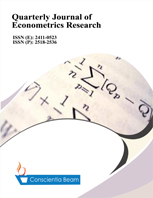The Effects of Exchange Rate Variability on Trade Flows in Nigeria: A Cointegration Analysis
DOI:
https://doi.org/10.18488/journal.88.2017.32.12.51Abstract
This study is designed to investigate the effects of exchange rate changes (volatility or variability) and other macroeconomic variables such as real exchange rates, real foreign and domestic income, terms of trade and lagged exports and imports on trade flows in Nigeria. The study examined the long-run macroeconomic factors of exports and imports in Nigeria using Johansen cointegration tests and analysis for the period 1971 to 2011 studied. The time series properties of the data were first analyzed using the Augmented Dickey – Fuller (ADF) tests to execute unit root tests for the relevant trade indicators. The study found a long-run cointegration relationship between trade flows and their determinants. It further discovered that exports and imports exhibit varied sensitivity to exchange rate risks (i.e volatility or variability). Thus, a stable exchange rate is recommended for expansion of trade and stable growth of the national economy as persistence in exchange rate volatility would snowball into a depression if not arrested on time via application of a managed floating exchange rate regime by the central bank of Nigeria. More-so, there are other viable policy options that should be adopted by the government to stop this sliding trend like restructuring the domestic economy from consumption to production using agricultural and industrial sectors diversification. In particular, the policy of a guided deregulation of foreign exchange market is strongly recommended instead of allowing the market forces to determine the value of the domestic currency vis-à-vis other key currencies of the world. This is because foreign currency is scare and sources of its inflow is few as at present.

